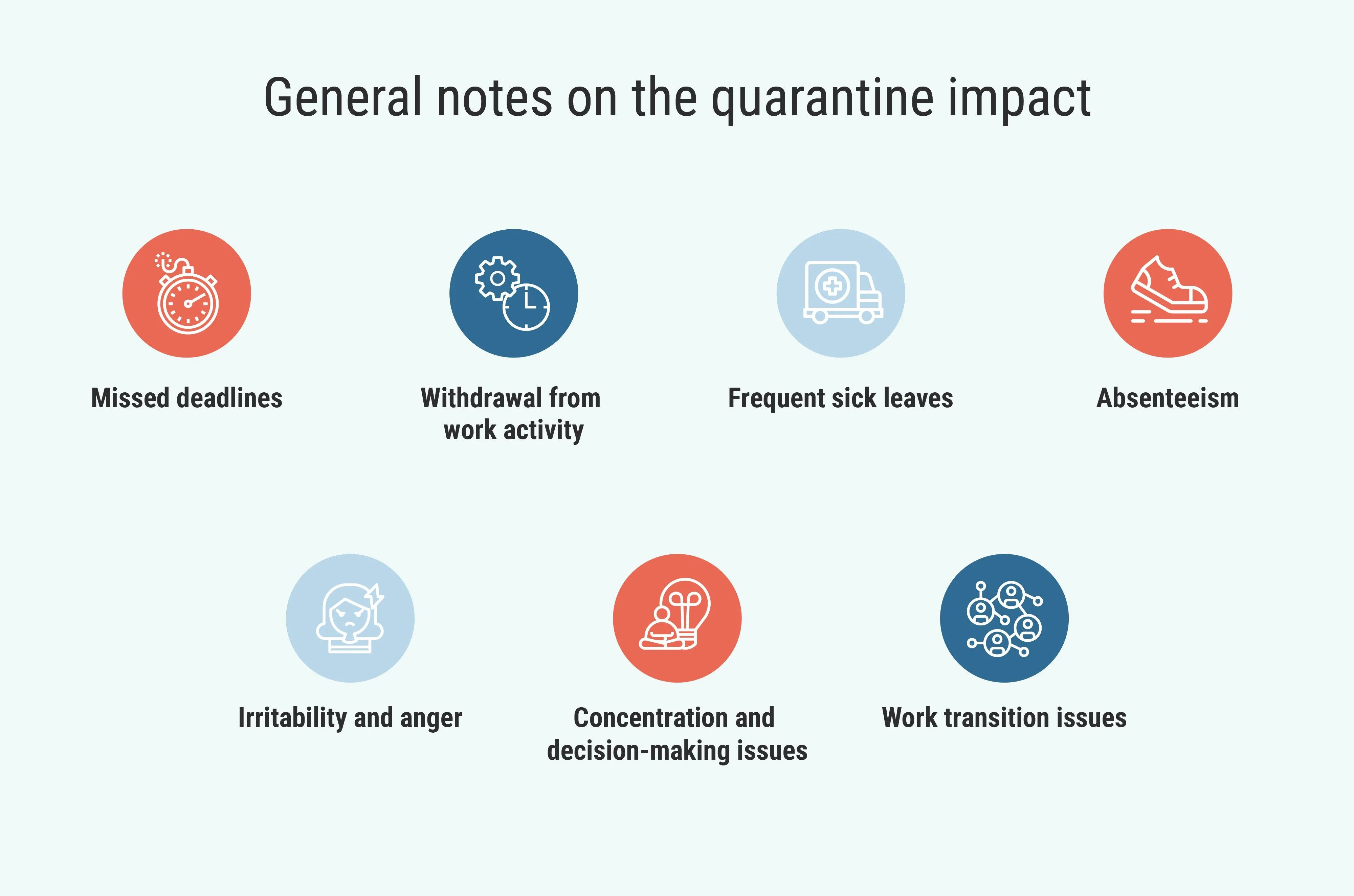Tips for Coming Back to the Office After Quarantine
Table of contents
- General notes on the quarantine impact
- Coming back tips for employees
- Fix your sleep schedule
- Be patient to yourself
- Seek for your team support
- Don't get overloaded
- Focus on positive sides
- Tips for managers
- Build plans and set clear expectations
- Communicate with your team
- Add some flexibility
- Set realistic deadlines
- Share the common schedule with your team
- The bottom line
The impact of the forced quarantine on employees is often compared to how astronauts feel as they return home from space stations: disorientation becomes one of the significant challenges to deal with. So, awakening after the long period of physical distancing and work from home is not that simple as it may first seem.
Nevertheless, some tips can help in getting back to normal. In this article, you will find a little advice for both employees and their managers. And while we are not claiming to reinvent America, we do hope that the information below will be useful.
General notes on the quarantine impact
As we already mentioned before, the major challenge — disorientation — can lead to various issues, mostly affecting employees performance and productivity. So what are the signs that can signify the emotional impact of long-term isolation and work from home to the way things are in the office? Here are some of them:

Whether you are the one who faces some of these issues yourself, or you notice your employees tend to show the signs of post-quarantine disorientation, it's a chance to minimize them in both cases. Below, there are two sections: the one with tips for employees willing to get back to their usual performance indicators, and the one for managers desiring to help their teams.
Coming back tips for employees

It won't be an exaggeration to say that most employees feel notably stressed by the fact that it's time to get back to the office. And it's not surprising because people who got used to the laid-back home-office routine often get quite frustrated. So here are some of the self-help tips that can contribute to smoother adaptation:
Fix your sleep schedule
It's only natural that work from home routine affects your sleeping and waking cycle. So the first thing to do is to normalize it. Just go to sleep and wake up every day at the same time, and it will take you just about a couple of days to get back in the game.
Be patient to yourself
Long-term isolation turns the most desperate extraverts into introverts, so when returning to the office, many people feel anxious about the flow of conversations. Furthermore, talks at the office can drive attention away from work activities, making it harder to focus and concentrate. The thing to understand is that it's absolutely ok to feel that way. Be patient to yourself and don't try to pretend that nothing has changed.
Seek for your team support
Always remember that you're not the only one who faces all the inconveniences of the suddenly changed work situation. A lot of people around you probably feel the same way, so the best thing you can do to each other is to provide some support.
Don't get overloaded
In the first two weeks, try not to overload yourself with tons of tasks. Focus on the most important ones and don't blame yourself for doing so. It will help you to go through the process of adaptation quicker and with less stress.
Focus on positive sides
When feeling dissatisfied by the fact you have to go to the office, remind yourself of all things you've been missing: whether it is morning coffee with your colleagues or some pleasant talks. Enjoy them all, and remember that the grass is always greener on the other side of the fence.
Tips for managers

Coming back to the office is even more challenging for managers who have to deal with their own adaptation issues and should also somehow help their teams to pass this complicated period with ease. So, what managers can do to contribute to a better adaptation of employees in the office?
Build plans and set clear expectations
It was nearly impossible to plan ahead with the sudden pandemic situation but for now, you have this opportunity. So the first thing you can do as a manager is to identify resources, set project priorities, and clear expectations, so your team can rely on your leadership and know what to expect.
Communicate with your team
It's not just about re-establishing communication channels but also about ensuring that all of your employees have everything needed to work in the office. Months of quarantine have changed a lot of things (for ex., in terms of lost child care opportunities for some of the employees), so as a manager, you need to know what obstacles your team members are facing to help them find solutions and in this way ensure their successful return. Also, it's a good idea to schedule kind of a "welcome back to the office" meeting.
Add some flexibility
Note that for some employees, coming back to the office after the quarantine is a really big change. There would probably be some cases when some of your team members are not able to shift to the in-office schedule in a moment, so adding some flexibility for a certain period is a good idea. Consider offering your team some options: whether a couple of days a week or hours per day of the optional work from home.
Set realistic deadlines
When people are stressed, it becomes harder for them to focus on tasks and concentrate on their work activities. This means that their productiveness decreases until the stress gets relieved. So when setting deadlines for your returning to the office team, keep that in mind.
Share the common schedule with your team
If you want your team to work in the office from, for example, 9 AM to 6 PM, follow this schedule as well. Your team will look to you for leadership and follow your example.
The bottom line
2020 is quite a challenging year for all of us. It's filled with numerous meaningful and impactful events that make lots of people face kind of an adjustment disorder, which symptoms include difficulties in handling daily activities, withdrawals from social support, avoidance of such important things such as going to work, troubles with sleeping, worries, etc. And it's evident that all of those things have a strong impact on working activities and should not be neglected. For this reason, the current post was nearly entirely focused on the psychological issues of coming back to the office. We do hope that in the current situation, the understanding of what people around us are going through will help to become more supportive and patient to each other. So take care of yourself and those around you, and thank you for reading.
Published on Aug 28, 2020





